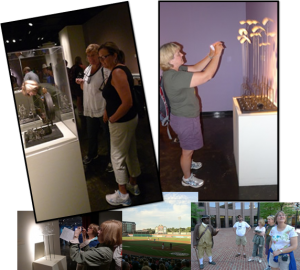 Constructing Modern Knowledge 2011 ended just a few days ago and I’m exhausted, but in the words of David Letterman, “It’s a good kind of tired.” CMK 2011 stands as one of the highlights of my career. Not only was I able to create a productive learning environment for approximately 90 educators from Australia to Costa Rica, but they were able to interact with brilliant experts, authors and inventors, including Jonathan Kozol, Derrick Pitts, Lella Gandini, Mitchel Resnick, Brian Silverman, Cynthia Solomon and Marvin Minsky. Some of us toured the wondrous MIT Museum and explored the Boston Freedom Trail. We socialized at a minor league baseball game, over meals and at the MIT Media Lab.
Constructing Modern Knowledge 2011 ended just a few days ago and I’m exhausted, but in the words of David Letterman, “It’s a good kind of tired.” CMK 2011 stands as one of the highlights of my career. Not only was I able to create a productive learning environment for approximately 90 educators from Australia to Costa Rica, but they were able to interact with brilliant experts, authors and inventors, including Jonathan Kozol, Derrick Pitts, Lella Gandini, Mitchel Resnick, Brian Silverman, Cynthia Solomon and Marvin Minsky. Some of us toured the wondrous MIT Museum and explored the Boston Freedom Trail. We socialized at a minor league baseball game, over meals and at the MIT Media Lab.
Supported by an amazing faculty, CMK 2011 participants engaged in dozens of hands-on/minds-on projects and expanded their vision of how computers can transform learning. (Specific examples will be shared at constructingmodernknowledge.com in the coming days.)
During the flurry of CMK 2011 activity, I stole away a few minutes to create a presentation intended to wrap-up the four-day institute. While thinking about the lessons of CMK 2011, several words beginning with the letter “C.” In the spirit of the great philosopher Mick Jagger who once said, “Anything worth doing is worth overdoing,” I ended up with an absurd number of C-words reflecting the lessons of Constructing Modern Knowledge 2011 in no particular order.
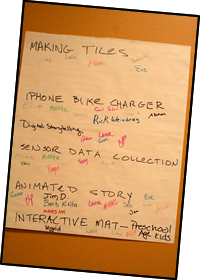 Create
Create
CMK 2011 was all about creating and creativity for six or more hours each day.
Construct
Since knowledge is a consequence of experience, constructing things creates rich contexts for learning..
Collaborate
CMK 2011 participants collaborated with colleagues and new friends met at the institute when such interdependence is mutually beneficial. Participants also sat shared expertise and worked with an expert faculty.
Concrete
Human development progresses from concrete to abstract. Piaget and Papert suggest that every time you learn something new, you return to a level of concreteness. Engineering is a manifestation of concrete experience, yet the only people who get to study engineering are the ones who successfully navigated twelve to fourteen years of abstraction (school math and science). If learners start with engineering projects, a great deal of formal knowledge will be constructed. This was demonstrated numerous times throughout CMK 2011.
 Courage
Courage
CMK 2011 participants demonstrated courage in myriad ways. They chose to spend four days of their summer at Constructing Modern Knowledge. They jumped in and began working on open-ended projects. They asked for help. They shared their insecurities and triumphs. They helped themselves to unauthorized tours of the MIT Media Lab. They engaged courageously in conversation with brilliant people.
 Conversation
Conversation
Educators at CMK 2011 engaged in constant formal and informal conversations with participants, faculty and guest speakers during project development, presentations and over meals.
Crazy
Some might think that it’s crazy to spend four or five days of summer vacation in Manchester, NH. Others might accuse CMK 2011 participant of being crazy for believing that they can change the educational experiences of their students. Surely, some initial project ideas seemed crazy. Connecting LEGO to a bicycle in order to charge an iPhone while peddling to work seemed crazy – until it worked.
 Complex
Complex
CMK 2011 projects displayed a great deal of complexity. All sorts of skills and knowledge were required, even if that knowledge and skill needed to be developed within the context of the project.
Challenge
Brian Silverman told us that the MIT approach is to give students a really hard project challenge and assume that they can do it. At CMK 2011, participants set really hard challenges for themselves and in most cases succeeded.
Competence
Competence is a related principal to challenge. The educators of Reggio Emilia, Italy believe that learners are competent. Constructing Modern Knowledge was designed to demonstrate the competence of each learner and their ability to learn without being taught.
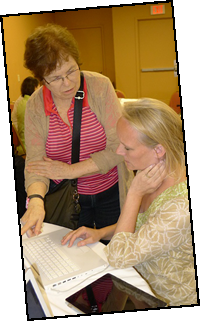 Care
Care
Educators cared enough about themselves and their personal growth to attend CMK 2011. They cared about the work they did and for each other. Great care was taken in the process of creating personally meaningful projects.
Comfort
CMK 2011 participants worked when, where and how they felt most comfortable, even when they ventured outside of their “comfort zone.” The hallway, picnic tables, parking garage, floor and lobby were all part of the learning environment.
Craft
Timeless craft traditions were honored through storytelling, mixed media, historical connections, a quest for beauty and collaboration during the project development process. Sewing and photography took their rightful place alongside programming, animation and robotics. The marriage of the analog and digital contribute to the continuum of craft.
Crap
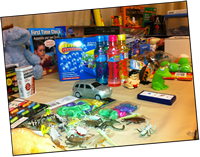 You never know what will inspire a learner. That’s why the CMK 2011 learning environment was filled with toys, books, art supplies, software, electronics, tools and assorted tchotchkes. A wooden automata kit became a talking Thomas Edison puppet and crappy plastic aliens inspired a robotics project.
You never know what will inspire a learner. That’s why the CMK 2011 learning environment was filled with toys, books, art supplies, software, electronics, tools and assorted tchotchkes. A wooden automata kit became a talking Thomas Edison puppet and crappy plastic aliens inspired a robotics project.
Curiosity
Since curiosity is a hallmark of good project-based learning, the number and variety of projects in-progress at CMK 2011 sated the curiosity of learners.
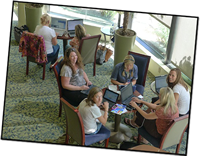 Casual
Casual
Despite the high-intensity work engaged in my CMK 2011 participants, the learning environment was relaxed, flexible and kept interruptions to a minimum.
Children
Kids are the reason we are all educators. CMK 2011 participants honored the epistemological pluralism of their students by spending four days learning for themselves in the childlike fashion one hopes they nurture in their own students.
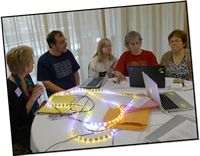 Cutting-edge
Cutting-edge
CMK 2011 participants worked with cutting-edge software and emerging technologies, such wearable computing via Lilypad Arduino. They also engaged in discussions of cutting-edge educational issues with Jonathan Kozol, Lella Gandini, Derrick Pitts and Mitchel Resnick. Constructing Modern Knowledge demonstrates the educators’ competence and capacity for growth. We also demonstrated how learning need not follow a sequential curricular hierarchy created by others. Learners of all ages may work on the cutting-edge as a productive relevant context for learning all sorts of other things.
 Connections
Connections
Learning at Constructing Modern Knowledge exemplified the importance of connections between disciplines, low and high-tech materials, historic eras, strategies, learners and experts. The learning environment supports guest speaker Marvin Minsky’s adage, “You don’t really understand something until you understand it in more than one way.”
Community
A community of practice forms at Constructing Modern Knowledge around shared interests and actions. Bringing educators together to learn from and with experts enriches that community.
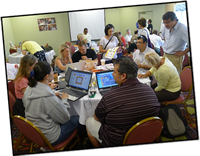 Computing
Computing
Schools have lots of computers, but very little computing. A few years ago, CMK guest speaker Brian Silverman said. “Computing is the game changer.” Computing allows one to solve problems, make things and express oneself in ways impossible without computation.
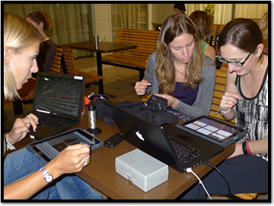 There were many moments at Constructing Modern Knowledge that reminded me of when Seymour Papert was asked, “Do you really mean to suggest that every child should have a personal computer?” Papert would respond, “No, every child should have at least two computers.”
There were many moments at Constructing Modern Knowledge that reminded me of when Seymour Papert was asked, “Do you really mean to suggest that every child should have a personal computer?” Papert would respond, “No, every child should have at least two computers.”
Throughout CMK 2011, participants were spontaneously using iPads as the way they were intended; as accessories for their laptops.
Constructionism
Constructing Modern Knowledge was created to model Seymour Papert’s theory of constructionism. You can learn more about constructionism here.
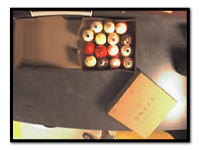 Cupcakes
Cupcakes
Ooey-gooey gourmet cupcakes were the refreshment of choice for our reception at the MIT Media Lab. They honored Professor Resnick and his Lifelong Kindergarten Group and celebrated the childlike abandon with which CMK 2011 learners worked throughout the institute.
At the end of the event, the leftover cupcakes were placed under the “foodcam,” an ingenious Media Lab invention that automatically emails a photograph of free food with a “come and get it” message to everyone at the lab!
Chapeau
 At the start of Constructing Modern Knowledge, I ask participants to “take off their teacher hats and put on their learner hats.” This seeming act of selfishness enriches the learning experience in remarkable ways.
At the start of Constructing Modern Knowledge, I ask participants to “take off their teacher hats and put on their learner hats.” This seeming act of selfishness enriches the learning experience in remarkable ways.
Several teachers from The Willows Community School in Los Angeles (the third year a large team from their school has attended CMK) designed to build a concrete manifestation of this metaphor by using the Lilypad Arduino wearable electronic components to make a teacher that may be switched from teacher to learner to a combination of both!
Conclusion
There is one obvious C-word I left off of my list mistakenly – CHOICE. Learners at CMK 2011 had complete freedom to choose, what, how and when they would learn. Participants selected projects in a coercive-free environment unimpeded by curriculum.
Don’t take my word for it, read the great CMK 2011 blog posts written by participants!
From Kate Tabor
- Starting With a Blank Page
- Day 3 at CMK11: Ways of Knowing
- Day 2: CMK 2011 – Inspiration and Renewed Enthusiasm
- Looking for the Colonel
- Best Advice of the Day
Adam Provost’s blog post about CMK 2011
Veteran educator Gary Stager, Ph.D. is the author of Twenty Things to Do with a Computer – Forward 50, co-author of Invent To Learn — Making, Tinkering, and Engineering in the Classroom, publisher at Constructing Modern Knowledge Press, and the founder of the Constructing Modern Knowledge summer institute. He led professional development in the world’s first 1:1 laptop schools thirty years ago and designed one of the oldest online graduate school programs. Gary is also the curator of The Seymour Papert archives at DailyPapert.com. Learn more about Gary here.

Sounds like this was a wonderful learning event, Gary! Did you record any participant responses / experiences at or following the workshops?
I hope I can attend one day. Keep up the great work!
Wes,
Here is a collection of learning stores from the institute:
http://constructingmodernknowledge.com/cmk08/?p=1263
This is the documentary a group of participants made:
http://vimeo.com/26466518